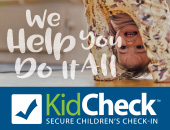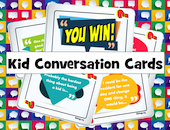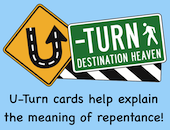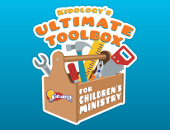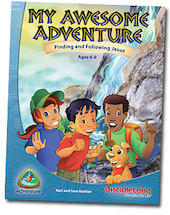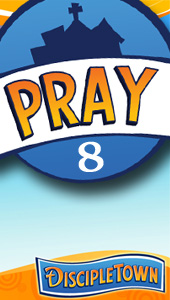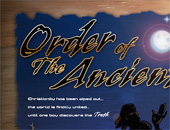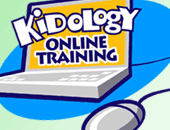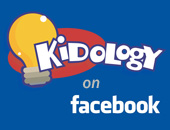There's an App for That
Membership Level› Guest
Author/Source: Henry Zonio
Topic: Biblical literacy, technology
With the Bible at the touch of an iPhone, what does it mean for kids to be biblicaly literate in the Internet age?
![]() Download There's an App for That
Download There's an App for That
(PDF, 324k)
This article by Henry Zonio originally appeared in "Children's Ministry Magazine" - September/October 2011
In a random fourth-grade class not too long ago, the teacher recited that week's verse with the kids. But only a few were repeating the verse along with him. Finally, one boy raised his hand. Voicing what all the kids were really thinking, the boy asked, "So, why are we memorizing this verse? Can't we just look it up online whenever we want to?"
In a world where information on any topic is available with a few keystrokes, a click of a button, or a series of swipes across a touchscreen, where does Bible literacy fit in? Are we out of touch when we insist kids bring a paper-and-ink Bible to church when there are multiple Bible apps on their iPhones and iPods? To be blunt, is learning Bible verses for the sake of biblical literacy a futile and outdated idea?
The End of Biblical Literacy as We Knew It
Learning Scripture is still important. We want children to be transformed by God, so it's imperative they know the book that tells them who God is, who Jesus is, and who the Holy Spirit is. We want them to be children of "the Book."
Ironically though, in an age of unprecedented access to God's Word, a recent study by the Barna Group indicates that a large-and growing-number of people don't know the "basics," such as the Ten Commandments or the names of Jesus' disciples. A recent Lifeway Research survey asked the question, "How often, if at all, do you personally read the Bible?" A whopping 47 percent said they rarely or never read the Bible.
Perhaps we need to step back and, rather than bemoaning people's ignorance of biblical content, rethink "biblically literacy."
"I was taught that memorization was important because one might need to call up an important Bible verse and not have a Bible handy," said Ivy Beckwith, author of Postmodern Children's Ministry. "But if one has a Bible on one's phone, that reason goes out the window. Perhaps we need to teach [kids] that 'hiding God's Word in one's heart' is personally transformative."
Sadly at times, rather than life transformation being the motivation for learning the Bible, we urge kids to quote Scriptures to win a prize. But knowing God's Word is less about information recall and more about being engaged by and immersed in the Word of God. Second Timothy 3:16 indicates that the Word of God is about far more than mere memorization: "All Scripture is inspired by God and is useful to teach us what's true and to make us realize what's wrong in our lives. It corrects us when we're wrong and teaches us to do what's right."
The Ride of Biblical Literacy as Transformation
The challenge we have in teaching the Bible to children today results partly from our lack of true understanding of the digital revolution. We focus on new tools available to us, thinking all we have to do is take advantage of those tools to encourage biblical literacy in children. We have to realize, though, that this digital age has not only changed how we access information, but it's altered society and culture. How we understand life and community has changed. How we process information has changed. These changes require us to adopt a new way of teaching the Bible to children.
First, we need to inspire children to hear and read the Bible as a whole. I think Scott Aughtmon, pastor of Pathway Church in Palo Alto, California, states it best: "We read the Bible to recognize what God sounds like." Unfortunately, our society has turned reading the Bible into something we "have" to do. As a result, we read the Bible as if it were a collection of disconnected short stories or morality tales akin to Mother Goose fables. Beckwith suggests that we "should just tell the stories of the Bible over and over again, allowing children to play with them and reflect on those stories while paying attention to how each individual story fits into" the bigger truth about who God is.
Fortunately, we don't have to do this connecting on our own. There are a number of great resources that connect individual Bible passages to the overaching account of God's love for us and the redemption of creation. For example, The Jesus Storybook Bible by Sally Lloyd-Jones weaves God's plan of redemption throughout many of the major events of the Old and New Testaments using art and language that captivates the imagination of the entire family.
Another wonderful resource is a video resource by Phil Vischer (Veggie Tales creator) called What's in the Bible. This resource walks children and families through each book of the Bible while highlighting the major themes of each book and how they all connect. It's all done in Vischer's unique style using witty songs and engaging humor.
And even though Vischer uses the latest technology to create videos that entertain and teach kids, he doesn't believe cool technology alone is the solution to the current state of biblical illiteracy. "I don't think the verse says, 'Thy Word have I hid in my iPad,' " says Vischer. "God's Word transforms us when it's internalized. Until kids are born with [memory] card slots in their heads, this means they need to internalize God's Word the old fashioned way-by learning it."
Second, we must help children see the Bible as more than an instruction booklet. Children need to grasp the Bible more as the source for understanding God than the source for understanding ourselves. We have to get beyond the question, "What does the Bible have to say to me?" Guide kids to ask questions such as, "What does what I'm reading in the Bible say about God? What does it say about the kingdom of God?"
More than ever, we're connected to the world through various social networks. Children are growing up in a society that isn't restricted to their street, city, state, or even their own country. Children are very aware that they're part of a global community. When our reading and understanding of the Bible becomes less about our own lives and more about what God is doing in the world around us, the Word of God has the potential to transform a globally connected society.
Third, as we help children experience the Bible anew, we need to help them connect it with life. "I am troubled when we focus all of our time in the church teaching information that can be accessed at a keystroke," says Matt Guevara, a pastor at Christ Community Church in St. Charles, Illinois. "This information is helpful, but is it worth the amount of time we spend teaching it? Faith skills like Bible reading, prayer, honesty, and integrity-these are the kinds of things that stay with a child for a lifetime…Teaching how to find passages in the Bible is only part of a much larger faith skill-set that children need. I think digital resources can help us appropriate these skills in tremendous ways."
This isn't an easy thing to do. Most of us have been trained by the curriculum we use to connect a main point, application, or virtue to every Bible passage we teach. It's important to make space for kids to reflect on the passages themselves, allowing the Holy Spirit to reveal himself in those words. Consider encouraging children to silently meditate on a passage of Scripture, listening to what it says about God, and then sharing their thoughts orally, in writing, or artistically. Or let kids create videos, blogs, or digital works of art to retell Bible events. As children "play" with God's Word, they can "taste and see that the Lord is good" (Psalm 34:8). As you give them the space and freedom to explore God's Word, the more they'll want to practice faith skills that bring them closer to God.
In a 21st century context, kids need to recognize that the Bible is primarily about God and is global in scope. Children also need space to internalize God's Word using a variety of physical and digital tools. When you help kids approach the Bible in these ways, it's no longer tied to the medium it's communicated in. Whether the Bible is printed or it's an app on the phone in my pocket, it's alive. Knowing the Bible is still about learning it, but it's also about much, much more. Biblical literacy becomes about living the Word of God. And it becomes about experiencing the Bible in new ways.
In the words of Phil Vischer: "Content is content. Free the Bible from the printed page, and watch it fly!" cm
Henry Zonio has 20 years' experience in children's ministry and operates Elemental CM, which moves ministry to children and families forward through coaching, consulting, and blogging.
Reprinted by permission, Children's Ministry Magazine, Copyright 2011, Group Publishing Inc., Box 481, Loveland, CO., 80537



